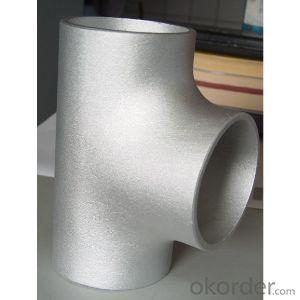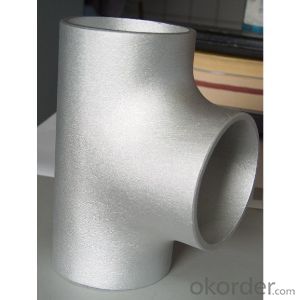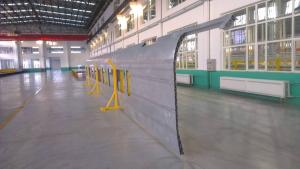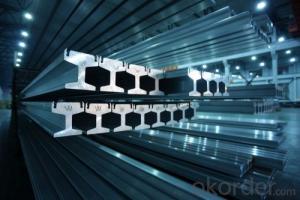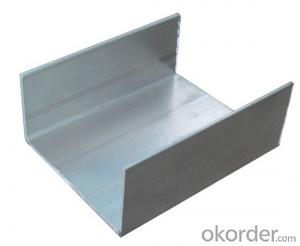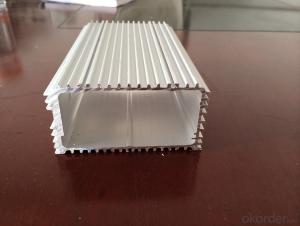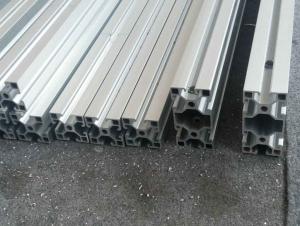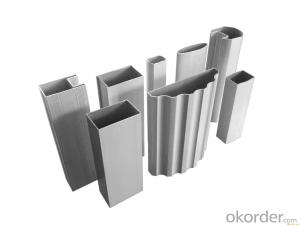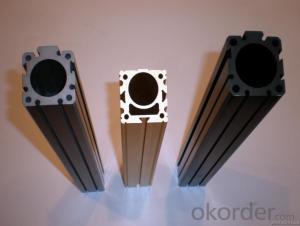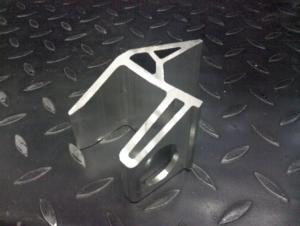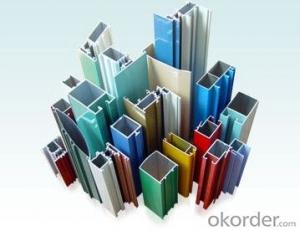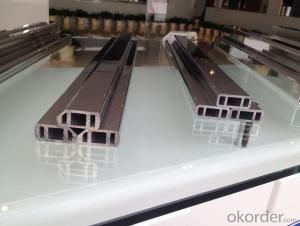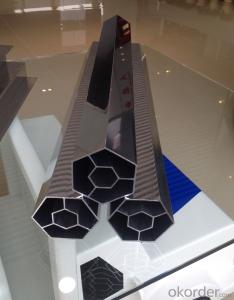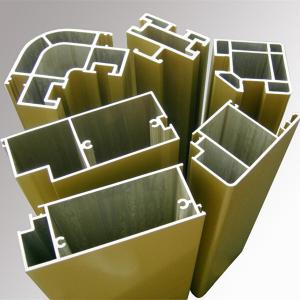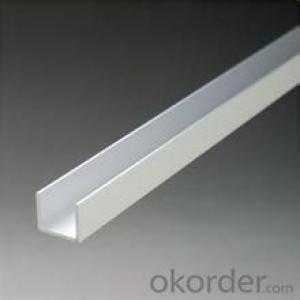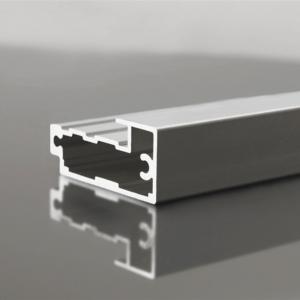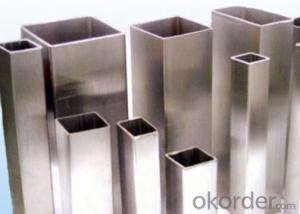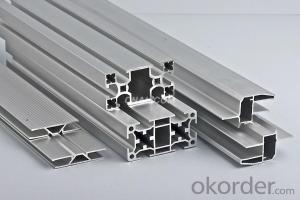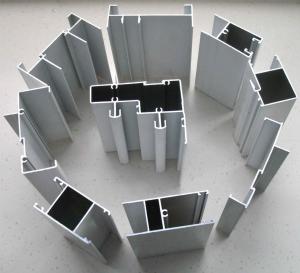Aluminum Extrusion Profiles Solidworks Aluminum Pipe-Tee Profile
- Loading Port:
- China Main Port
- Payment Terms:
- TT OR LC
- Min Order Qty:
- -
- Supply Capability:
- -
OKorder Service Pledge
OKorder Financial Service
You Might Also Like
Material:Aluminum
Size:1/2'' to 72''
Thickness:sch10-XXS
Certificate:API,ISO9001,PED
Type | aluminum pipe fittings --tee |
OD | 1/2"-48" |
WT | SCH40-SCH160 |
Standard | ASME, GB, DIN, JIS ,BS, ISO, and so on. |
Material | 7075,7050,7055,2024,1100,6262,6082,5052,3003 and so on |
Certificate | ISO9001:2000 , ASME and Boiler A-level |
Packaging | wooden case or pallet |
Application | petroleum, chemical industry, medicine, electric power, astronautics, war industry, fire prevention, metallurgy, shipbuilding, fuel gas, nuclear electricity, urban construction, hot-water heat and environmental protection etc. |
Others | Special design available according to your request |
- Q: What are the vibration damping properties of aluminum profiles?
- Aluminum profiles exhibit good vibration damping properties due to their inherent material properties, such as high stiffness and low density. These properties enable the profiles to effectively absorb and dissipate vibrations, reducing their transmission through the structure. Additionally, aluminum profiles can be further enhanced with damping materials or techniques to improve their vibration damping capabilities.
- Q: Are aluminum profiles compatible with glass?
- Yes, aluminum profiles are compatible with glass. Aluminum profiles are commonly used as framing systems for glass panels in various applications such as windows, doors, curtain walls, and partitions. The compatibility arises from the fact that aluminum is lightweight, durable, and corrosion-resistant, making it an ideal material for holding and supporting glass panels. By utilizing various profile designs, aluminum frames can securely hold different types and thicknesses of glass, providing structural stability and aesthetic appeal to the overall construction. Additionally, aluminum profiles can be customized and engineered to accommodate specific glass installation requirements, ensuring a perfect fit and compatibility between the two materials.
- Q: Aluminum surface treatment products we have color (pure black and beige wood etc.), the surface coating by scratching the surface, color and color difference of aluminum (aluminum color, the background is simple) after repair or there will be a difference at present, technical staff provides a profile of color, it can paint pen profile the scratch (paint pen according to the material surface spray paint, please fill out this factory can scratch the gap! It's really hard to findConsult an expert who specializes in aluminum processing. What's the effective remedy for scratching after spraying? Are there any professional manufacturers of this kind of paint pen?
- Please fill out paint pen manufacturers can scratch the gap, is the best way, the color of the paint can't find the same, have a great relationship with the concentration ratio, so, when buying sheet with requirements of factory repair paint pen!
- Q: Is it possible to use aluminum profiles as a material for exterior walls or facades?
- <p>Yes, aluminum profiles can be used for exterior cladding or siding. They are known for their durability, low maintenance, and resistance to weather and corrosion, making them ideal for exterior applications. Aluminum profiles are lightweight, easy to install, and can be painted or finished in various ways to match architectural designs. They also offer excellent thermal performance and can be recycled, contributing to sustainability.</p>
- Q: What are the different anodizing colors available for aluminum profiles?
- There are several different anodizing colors available for aluminum profiles, including clear, black, bronze, gold, and champagne.
- Q: Will the aluminum profile be deformed at about 100 degrees?
- Subject to circumstances:1, aluminum material or brand2 、 what is the forming state of aluminum profile, such as conventional: O, T4, T5, T6 and so on3. How long is it within 100 degrees of heat? Continuous or intermittent entry, such as intermittent access, interval time, etc.4, the aluminum profile forming itself has a certain mechanical strength, such as tensile and yield and ductility, etc., but these mechanical strength is based on different materials (section shape) in different extrusion processing (T) Inferior.For example, a solid bar around 10MM, material 6061-T6, a short time into the furnace temperature of 100 degrees, the annealing temperature will make its hardness drops more quickly, then a long time will decrease, but no hardness.The material you say can not be deformed, the aforementioned points need to be clear, or any answer is biased, and I hope to help you!
- Q: Can aluminum profiles be used for shelving systems?
- Certainly, shelving systems can indeed utilize aluminum profiles. Renowned for their robustness, longevity, and adaptability, aluminum profiles prove to be an excellent selection for a wide range of uses, including shelving systems. One can effortlessly tailor and manufacture them to suit particular measurements and specifications, enabling the creation of shelving systems in various sizes and designs. Furthermore, owing to its lightweight yet sturdy nature, aluminum permits straightforward installation and upkeep. Additionally, it exhibits resistance against rust and corrosion, rendering it suitable for indoor as well as outdoor shelving systems. On the whole, aluminum profiles present a dependable and effective solution for shelving systems.
- Q: This question asks about the various methods used to finish aluminum profiles, including painting and coating.
- <p>Aluminum profiles can be finished in several ways to enhance their appearance, durability, and functionality. Common methods include: 1. Anodizing, which provides a protective oxide layer and can be colored. 2. Powder coating, an electrostatic process that offers a durable and colorful finish. 3. Painting, which can be done with various types of paint for aesthetic or protective purposes. 4. Polishing, which gives a shiny, smooth surface finish. 5. Brushing, creating a textured, satin-like appearance. 6. Electroplating, which deposits a thin layer of metal onto the aluminum for decorative or protective reasons. Each method has its advantages and is chosen based on the specific requirements of the application.</p>
- Q: Are aluminum profiles suitable for constructing energy-efficient building systems?
- <p>Yes, aluminum profiles can be used to create energy-efficient building systems. They are lightweight, strong, and have excellent thermal conductivity, which can be advantageous in heat transfer management. Aluminum profiles can be used in the construction of windows, doors, and facades, which are critical for insulation and energy conservation. Additionally, their malleability allows for precise engineering to minimize heat loss and maximize energy efficiency. Proper insulation and sealing techniques can further enhance the energy efficiency of buildings constructed with aluminum profiles.</p>
- Q: Where is the exact location? TwentyBecause I was doing aluminum sales, want to go to the market!Where is the specific market aluminum sales, as long as there is, I have to go around! Say where it is! For example, what area, what road, how many?! Since I went to Chengdu for the first time, please tell me more about it. Thank you!
- 512 building materials market 'The two ring road north station over there direction
Send your message to us
Aluminum Extrusion Profiles Solidworks Aluminum Pipe-Tee Profile
- Loading Port:
- China Main Port
- Payment Terms:
- TT OR LC
- Min Order Qty:
- -
- Supply Capability:
- -
OKorder Service Pledge
OKorder Financial Service
Similar products
Hot products
Hot Searches
Related keywords
